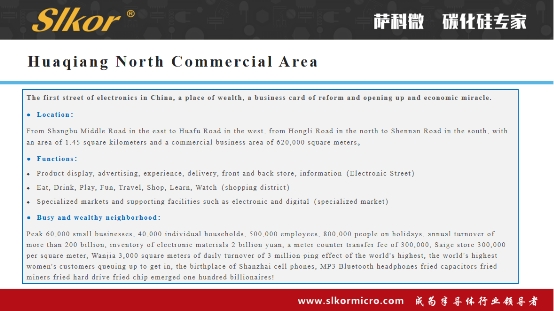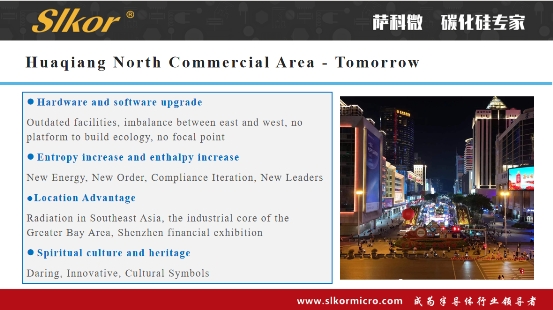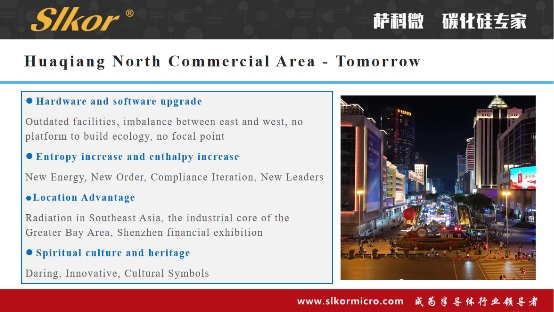The Tech-Innovations and Electronic IT Industry Eco-Systems in Huaqiangbei
Slkor CEO, Song Shiqiang
"Innovation is the soul of Shenzhen and Huaqiangbei, where daring to think and act without fear of failure has led to the economic miracle of Shenzhen and the wealth myth of Huaqiangbei! The first 'land auction' held in Shenzhen, China, the 'one-meter counter' in Huaqiangbei granting independent operating rights, breaking apart and selling thousands of electronic components in the smallest packaging, and the 'zero interference service' at Wanjia Department Store—all these innovations have supported the development of Huaqiangbei! However, this belongs to 'model innovation,' which is different from scientific and technological innovation and product innovation! Huaqiangbei has previously established several innovation centers and even a 'maker' base, all of which have closed down. A few days ago, during my research in Huaqiangbei, I specifically visited the 'Hardware Innovation and Entrepreneurship' demonstration area on the podium of the Zhongdian Zhigu Building, only to find it locked and in darkness. It seems that this innovation project has failed again."

Shenzhen Huaqiangbei: Location, Function, and Wealthy Hub
The main business model of Huaqiangbei is to sell electronic components to downstream hardware manufacturing enterprises. Downstream customers assemble the components and integrate them with software systems to produce electronic digital products. In the early stages of hardware production, customers need to consider product definition, market demand, assembly line production, debugging, brand operation, channel development, and management system construction, among other aspects. In order to make products more competitive and generate greater profits, there is a need for technological innovation and continuous product iteration. This requires internal systems and external ecosystem support, as well as the long-term accumulation of talent, technology, and connections, which are also the foundation of research and development and innovation. The "Hardware Innovation and Entrepreneurship" demonstration model of China Electronics Corporation essentially expands downstream in the industry chain to develop hardware products that have market competitiveness, but these genes are lacking in Huaqiangbei!
Huaqiangbei (Shenzhen Huaqiangbei) is an international electronic component distribution center. In Huaqiangbei, there are branding promotions, product displays, information releases, model matching, parameter selection, goods warehousing, physical experiences, authentic product identification, product maintenance, transaction settlements, goods distribution, as well as supporting services such as professional markets, finance, dining, leisure, entertainment, and shopping. The previously thriving "shanzhai mobile phones" and the current smart wearable devices in Huaqiangbei are examples of "covering half the face with a lute," involving technological imitation and product replication. These companies are characterized by small scale, poor foundations, and quick profit-making. However, engaging in technological innovation requires long-term investment and perseverance, and the success rate of entrepreneurship is extremely low, making the failure of these projects inevitable.

The electronic street of Huaqiangbei in Futian District, Shenzhen City, China.
On the other hand, due to overhead limitations such as rental costs, entrepreneurial atmosphere, development positioning, and resource matching in Huaqiangbei, technology companies have moved away after reaching a certain level of development. Examples include Shenzhou Computers, SLKOR Semiconductor (www.slkoric.com), Kinghelm Electronics (www.kinghelm.net), Haoen Technology, and Ma Huateng's Tencent company. When government departments, Huaqiang Group, SEG Building, and other property units are seeking investment, they should attract these companies back to contribute to the development of Huaqiangbei and to transform its research and development ecosystem.
Hardware products are defined by software, and this is also true for the rapidly growing new energy vehicle industry. Platform-based software and mobile internet can enable interactive intelligent hardware. For example, Huawei has nurtured an ecosystem of hardware products such as Huawei smartphones, smartwatches, laptops, Bluetooth headsets, conference systems, and connected vehicles based on its HarmonyOS operating system. Huawei has also attracted many external manufacturers to join the HarmonyOS platform, creating an ecosystem centered around Huawei. It is said that Xiaomi's MIUI operating system has more than 1.1 billion users, and their range of intelligent hardware products also form an ecosystem. Aside from brand value and services, this ecosystem has strong appeal and stickiness for customers, allowing for rapid iteration and continuous evolution of products.
Companies of this kind establishing themselves in Huaqiangbei will generate spill-over effects in terms of technology, products, concepts, and talent. Even if only a portion is introduced, it would greatly benefit the development of Huaqiangbei. Most of the small software developed in Huaqiangbei are embedded systems, with the majority involving the replacement of logos or UI interfaces on existing foundations, such as driver programs for shanzhai mobile phones or input applications for single-chip microcontrollers. Therefore, the Futian District government should put great effort into attracting large companies, as they are nodes in the electronic information ecosystem chain and have a strong driving force for the upstream, downstream, and surrounding areas!

Slkor Diodes
Based on the advantages of Huaqiangbei and other resources, innovation can be fostered. Huaqiangbei is a major hub for the electronics information industry, while Futian District boasts strengths in finance and exhibitions. By leveraging the trend towards domestication of electronic components, a domestic integrated circuit exhibition hall could be established in Huaqiangbei. This venue could serve as a platform for promoting and showcasing domestic semiconductor brands and companies, facilitating technological exchanges and collaborations, providing financial support and resource connections to promising companies, and driving the industry's healthy development. Exhibitions can attract attention and resources, bringing development opportunities to Huaqiangbei.
Following this approach, SLKOR Semiconductor (www.slkoric.com) is making strides on the internet, aiming to transform its official website into a professional, ecological, and inclusive platform. They have launched sections for technical exchanges, expert columns, data queries, electronic news, industry applications, and electronic encyclopedias. The upcoming "SLKOR Technology Lecture Hall" plans to regularly invite international experts and scholars to give lectures, featuring technical discussions, diverse perspectives, academic exchanges, and inviting peers to participate and interact online.
In the virtual space of the internet, SLKOR Semiconductor and Kinghelm Electronics are building industry ecosystems. The brands of Kinghelm Electronics' "Kinghelm" (www.kinghelm.net) and SLKOR Semiconductor's "Slkor" (www.slkoric.com) have already gained widespread industry recognition and reputation!

Song Shiqiang's discourse on Huaqiangbei's business district, professional markets, and China's premier electronics street
The integrated circuit industry is mainly divided into four major segments: IP design, wafer fabrication, product packaging and testing, and sales, with characteristics of high technology, large scale, and a globally distributed industry chain. Of course, there are also production, manufacturing, application, and maintenance processes downstream. The sales segment is further divided into channel sales through agents and scattered sales through traders, with the Huaqiangbei Electronics Market located at the trade end of the industry chain. Due to the large scale and diverse products in the electronics information industry, Huaqiangbei thrived over the past few decades driven by the strong growth in personal computers and consumer electronics.
Some visionary individuals in Huaqiangbei have ventured upstream – expanding their scale by signing on new product lines or aiming to control the core value of the industry chain by heavily investing in upstream original factory development. However, challenges exist as profit margins for agents are not ideal and they are constrained by others, making it even harder to develop towards original factories. Only resilient companies like Kinghelm Electronics, SLKOR Semiconductor, Huaguan Semiconductor, Jinyu Electronics, Kexin Electronics, Meilong Electronics, and Heke Tai have survived. Among them, SLKOR Semiconductor has shown relatively rapid growth in recent years.

Kinghelm offers products such as antenna connectors and Type-C connectors
Shenzhen lags far behind Beijing and Shanghai in the construction of the most crucial wafer fabrication plants in the semiconductor industry chain, and even falls short compared to Wuxi in Jiangsu Province and Hefei in Anhui Province. Consequently, it is unable to provide support to the integrated circuit IP design companies, product development firms in the Nanshan Science and Technology Park, electronic traders in the Huaqiangbei area of Futian District, and electronic manufacturers in the Shenzhen-Hong Kong-Macao Greater Bay Area.
Beijing boasts prominent universities such as Tsinghua University and Peking University, as well as research institutions like the Chinese Academy of Sciences, along with established wafer fabrication plants such as Yangtze Memory Technologies Company (YMTC). Additionally, Shanghai's government has proactively planned for the Zhangjiang area, where companies like SMIC (Semiconductor Manufacturing International Corporation) and Huali Microelectronics lead domestically, while achieving a positive cycle of talent cultivation.
In Shenzhen, notable integrated circuit design companies include Huawei HiSilicon, Himax Technologies, SLKOR Semiconductor, and GigaDevice, but only older and smaller wafer fabrication plants like Nanda Semiconductor and Shenzhen Goodix Technology are established. Although SMIC has established a sub-factory in Pingshan, Shenzhen in recent years, it has yet to gain significant traction. If Shenzhen were to have an advanced foundry plant similar in scale to SMIC, linked with electronic component markets in Huaqiangbei and technology parks, it could influence and radiate to surrounding factories in the Pearl River Delta region and even serve the global market.

Song Shiqiang's discourse on Huaqiangbei today is a bit lacking
Fortunately, the hardware ecosystem in the Greater Bay Area of the Pearl River Delta is robust, with strong manufacturing capabilities downstream. From the well-known "Triangle Brand" rice cookers of my childhood, popularized by the TV series "Fearless" back then, to today's household appliances from Midea, Gree, Galanz, as well as the thriving Huawei, DJI, ZTE, Kinghelm, BYD, Foxconn, Tencent, Luxshare Precision, OPPO, and the secretive gray market of 3C digital products, the fertile soil of electronic hardware in the Greater Bay Area is evident.
For Huaqiangbei, this situation is a mixed bag of joy and concern, akin to the Buddhist monk Hongyi's belief that life is a mix of sorrow and joy. It is hoped that the government will work hard to address shortcomings and contribute to the resurgence of Huaqiangbei. Here I am, adding fuel to the fire and cheering from the sidelines!

Song Shiqiang's insights on the future of Huaqiangbei: Finding a Way Forward
Brief introduction of Mr. Song Shiqiang
Mr. Song Shiqiang is the General Manager of Slkor semiconductor and Kinghelm Electronics, as well as an expert of the China Electronics Society, a research specialist in Shenzhen's Huaqiangbei area, and a columnist and science popularizer. Both Slkor semiconductor and Kinghelm Electronics, companies invested by Mr. Song Shiqiang, are headquartered in Shenzhen, China, and are certified as Chinese national high-tech enterprises. The Slkor semiconductor brand "SLKOR" (www.slkoric.com) and the Kinghelm brand "Kinghelm" (www.kinghelm.net) have achieved international renown and reputation, gradually expanding their market share.
Kinghelm's Dongguan Tangxia laboratory is equipped with a full electromagnetic compatibility chamber, network analyzers, high and low-temperature test chambers, and other instruments, enabling high and low-temperature tests, dual 85 tests, independent debugging, and prototyping of new products. The facility is fully equipped with technical positions such as mold making, injection molding, machining, electroplating, stamping, and wire harness assembly. Located in Luzhai County, Guangxi Province, Kinghelm's production base features multiple automated assembly lines, fully automatic wire cutting machines, terminal crimping machines, and assembly equipment. Personnel undergo training and assessment at the headquarters, ensuring skilled operators who can deliver large quantities of products on time while maintaining quality. The "Kinghelm" brand products, including Beidou GPS antenna connectors, Type-C, SMA connectors, are highly popular in the market!

SlkorSiC MOSFET
SLKOR (www.slkoric.com) products encompass three major series: diodes, transistors, and power devices. Additionally, new products such as Hall sensors, ADCs, and BMS have been introduced. The company's research and development efforts have resulted in the production of high-end products including silicon carbide (SiC) SBD diodes, SiC MOSFETs, IGBTs, and ultra-fast recovery power diodes. Moreover, SLKOR's general products cover Schottky diodes, ESD protection diodes, TVS transient suppression diodes, general-purpose diodes and transistors, as well as high, medium, and low voltage MOS transistors, FRD high-voltage diodes, SiC SBD high-voltage diodes, thyristors, bridge stacks, LDO, AC-DC, DC-DC chips, and other series of power management products. They also provide various sensors, general and high-speed optocouplers, and passive crystal oscillators tailored to customer needs. These products are extensively used in high-end equipment, communication and power industries, solar photovoltaics, medical devices, industrial Internet of Things, new energy vehicles, small two-wheeled vehicles, electric tools, and other sectors.

Mr. Song Shiqiang, the General Manager of Kinghelm and SLKOR
Mr. Song Shiqiang (Huaqiangbei Songshiqiang) is renowned for his research on the Huaqiangbei model and culture through a series of articles including "Research on Huaqiangbei,""The Future of Huaqiangbei,""Transformation and Development of Huaqiangbei,""Localization of the Electronic Component Supply Chain," and "The Spirit and Culture of Huaqiangbei." These articles have been republished by authoritative domestic media such as People's Daily, Xinhua News Agency, Global Times, and China Business News, as well as international outlets like The Associated Press, Yahoo News, Harvard Business Review, and The Wall Street Journal. His "Song Shiqiang Speaks" lecture series articles and short videos have been widely shared on platforms like YouTube and TikTok, contributing actively to the dissemination of traditional Chinese culture and providing insightful suggestions for social and economic development.
- WH&R Achieves Record Growth in AP in 2023
- L7 Launchpad's first IDO project, NEO FANTASY (ERT7), successfully raises $4.11 million.
- Wyndham Rewards Brings Back Member Month
- Pengkomputeran ialah P produktiviti. UtilityNet Mengubah Pengkomputeran daripada Teknologi Kepada Insentif .
- MagicPower: Top Market Potential at CIIE
- AI computing power shortage? UtilityNet proposes a groundbreaking decentralized solution.
- COP28国际青年可持续创新大会主场边会胜利举行
- TaoLiChinese is Invited to Participate in the 1st World Chinese Language Conference in Beijing
- Hong Kong Maritime Week 2023
- Exclusive Interview with Dr. David Foster: Experts in the field of nutritional supplements share the key to a healthy life
- VooPay: Ushering in a New Era of Global Crypto Payments, VOO Token to Launch on LBank
- VooPay and GC.Capital Forge Strategic Partnership with $1 Million Investment to Propel Web3 Ecosystem Growth and Innovation
- VooPay Partners with M3 DAO and Golden Carrot Capital: Enhancing the Web3 Spending Experience
- GSL Foundation Unveils a Groundbreaking New Crypto Ecosystem, Shaping the Future of Global Blockchain Finance
- Enhanced Vacation System Safeguards the Right to Rest and Travel for Chinese Citizens
- Hangzhou Shares Inspiring Stories of Talent and Urban Synergy at the International Human Resource Exchange and Cooperation Conference
- "Starry Bright Peng City, Happy Moon Bay" The New Silk Road Art Troupe kicks off the 2024 International Artistic Talent Community and the National Day event!
- "Starry Bright Peng City, Happy Moon Bay" The New Silk Road Art Troupe kicks off the 2024 International Artistic Talent Community and the National Day event!
- Hangzhou Shares Inspiring Stories of Talent and Urban Synergy at the International Human Resource Exchange and Cooperation Conference
- MetaMars Token Price Continues to Surge: Innovative Business Model Fuels Long-Term Growth